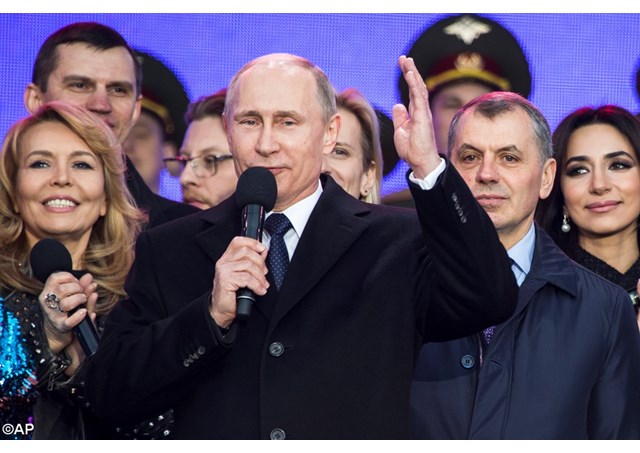
Celebrations marking Crimea's annexation despite rights concerns

(Vatican Radio) Government-backed celebrations have begun in Russia and Crimea to mark the 1st anniversary of Russia's annexation of the Crimean Peninsula, which was followed by a still ongoing conflict, and prompted fears in nearby countries they could be next. The commemorations came despite international concerns over reported human rights violations in Crimea.
Listen to this report by Stefan Bos
Fireworks illuminated the skies over the Crimean city of Sevastopol where thousands gathered for a massive anniversary party. Earlier Russian President Vladimir Putin told an enthusiastic crowd outside the Kremlin that the region had returned to its "historic roots”.
“We realised that the question of Crimea is not just a question of territories, even the territory of strategic importance," he said.
"This deals with the millions of Russian people. It's about the millions of our compatriots who need our help and support… Thank you for your support. Long live Russia!, he said at a highly choreographed event in Moscow that also saw him joining a choir singing Russian songs.
Putin has made clear that Russia will never hand back Crimea to Ukraine. Moscow has even sent nuclear-capable long-range bombers to the Black Sea peninsula and will deploy advanced missiles to its enclave of Kaliningrad, near borders of NATO alliance member states, as part of war games.
MINORITIES CONCERNED
That has added to concerns among Crimean minorities and those who oppose the annexation. Rights group Amnesty International says the pro-Russian authorities in Crimea and what it calls their "Russian masters" have waged an "unrelenting campaign of intimidation" whose message is "leave or shut up."
Tatars are among those targeted: At least 18 Crimean Tatars have gone missing in the past year, including 39-year-old Reshat Ametov. His dead and mutilated body was discovered two weeks after he vanished last March. No one has apparently ever been arrested for his killing or any of the other disappearances.
Following the ouster of Ukraine's pro-Russian president Viktor Yanukovych, Russia formally annexed Crimea on March 19, 2014. It was followed by a still ongoing conflict in eastern Ukraine between government forces and pro-Russian separatists.
The West accuses Moscow of sending weapons and troops to support the separatists. The Kremlin has denied the charges. However Russian Foreign Minister Sergei Lavrov says Ukrainian legislation on the status of rebel-held eastern regions this week is a "glaring violation" of a European-brokered peace deal
signed last month in Minsk.
Neighboring countries have expressed concern that Russia's involvement in Ukraine is part of a wider strategy to restore the Soviet Union.
RUSSIA TREATY
In fact Russia signed a treaty with Georgia's breakaway region of South Ossetia on Wednesday on almost full integration, raising pressure on an ex-Soviet neighbor that has sought closer ties with the West.
Russia already signed a similar deal with Georgia's other breakaway region of Abkhazia.
That's why neighboring countries are anxiously awaiting when and if the conflict in Ukraine will end. Yet one of the Kremlin's fiercest critics, Aleksei Navalny, suggests he is against boosting the Western supply of weapons to Ukraine's beleaguered army.
He said in an interview that he prefers sanctions as the "introduction of visa and financial restrictions for oligarchs would hit Putin’s regime harder than drones."
European Union leaders were to discuss sanctions later Thursday in Brussels.
| All the contents on this site are copyrighted ©. |


